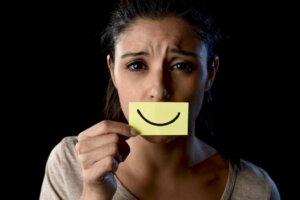Resisting the "Happycracy": Let Me Have a Bad Day

Positive psychology came along in the 90s with the work of psychologist Martin Seligman. He defined it as “the scientific study of what makes life worth living”. Since then, life coaches, motivational speakers, and self-help books essentially force you to be happy. The term for this “dictatorship” of happiness is called “happycracy”. Today, we’re going to talk about the psychological implications of having happiness forced upon you.
Is it wrong to have a bad day? Does being in a bad mood sometimes mean that I’m sick? Does getting upset because things aren’t going my way mean I need professional help to manage my life? The answer is a resounding “no”.
Pathologizing normal emotions actually leads to an epidemic of unhappiness. Ironically, if you feel like your happiness doesn’t measure up to the conventional definition, you’ll feel even more miserable.

What’s the happycracy?
What’s happiness? Is its meaning universal? Can someone teach you to be happy or give you the tools to be happy? The industry of positive psychology would say “yes”. If that were true, however, the incidence of depressive disorders and the suicide rate wouldn’t be rising so fast.
The message of the happycracy is that if you’re not happy, it’s your fault. It blames your way of thinking and your coping skills in different situations, as well as your inability to deal with negative emotions. After all, today, you have a whole industry at your fingertips to help you be happy. Life coaches, self-help books, stickers for your bathroom mirror to remind you to smile while you brush your teeth… Happiness is a business, in every sense of the word.
It seems that this obligation can be traced back to the James-Lange theory of emotion. It stated, incorrectly, that feelings come from facial expressions. That’s like saying “I’m sad because I’m crying” instead of “I’m crying because I’m sad”.
Thus, even though the world is going to hell, all I have to do is smile to feel happy again? Or if I’m going through a difficult time in my life, a message on a mug will make everything all better?
It seems ridiculous, but the number of people who buy into these messages is staggering. The problem is that the consequences of “positive” thinking are often very negative. The first is the complete and absolute intolerance of discomfort, no matter how minimal.
What are the consequences of forced happiness?
As we just mentioned, people today are fairly intolerant of discomfort, their own, and that of other people. We don’t like feeling sad because it makes us feel weak. How many times have you said (or heard someone say) to someone who’s crying, “But don’t cry!” How many times have you said, “I don’t want to cry” when your body is actually begging you to? Emotions are adaptive, they serve a purpose. Crying is sometimes very necessary and healthy.
Trying to repress emotions can make you feel worse than you even did to begin with. They can even make you develop serious emotional disorders. Here are some of the consequences:
Guilt
Feelings of guilt and a variable level of pressure. Pressure because the happycracy forces you to be okay, right now, because life is wonderful and, if you cry, you’re wasting it. And guilt, not just because you’re feeling bad at a particular moment, but also because you aren’t doing what you need to do to feel better.
You might need to be sad for a week, but that’s too much for society. Your emotions aren’t normal. Instead, you’re exaggerating, dragging things out. People might even believe that you like feeling depressed. The happycracy makes you a less empathetic person, capable of blaming other people for their unhappiness. Is there anything less human than that?
This, in turn, can cause:
Loneliness and a lack of social support
This is one of those rare times when the negative things you think other people are thinking about you may actually be true. You feel like the people around you won’t be able to accept your emotional state. And maybe they really can’t tolerate it, so they distance themselves. This happens because, just as you can’t accept your own sadness and discomfort, you don’t know how to respond to other people’s.
We’re social creatures. The reality is that a good support network is often the key to getting through a difficult time or recovering from a bad experience. It makes you feel loved, validated, and accepted. Without it, things get complicated. Your problems seem bigger and you’re more stressed and anxious.

Resisting the happycracy: respect your emotions and those of other people
Personally, I’m more of a Grinch than a Santa Claus. To me, there’s nothing more real, sincere, and sane than accepting sadness and anger. It’s normal to have bad days, no matter how resilient you are. Sometimes life gives you lemons and you don’t feel like making lemonade. Difficult circumstances that overwhelm you with no easy way out.
Having a bad day and feeling blue doesn’t make you a bad person. It makes you a real person. Be wary of people who are always happy because eternal well-being doesn’t exist. Perhaps their coping strategy is avoidance, which is much less healthy and constructive than experiencing and accepting negative emotions.
Forcing a smile when you’ve fallen to pieces is one of the most damaging things you can do for you mood.
Emotions, both positive and negative, serve different purposes. In other words, they’re necessary. Covering them up all the time just makes things worse.
Respecting your emotions and the emotions of others, normalizing them, and encouraging emotional expression doesn’t just make you more human. It encourages a healthy and respectful transition towards a more positive emotional state. One without obligations, impositions, or a timeline. Remember that you’re so much more than one negative emotion.
This text is provided for informational purposes only and does not replace consultation with a professional. If in doubt, consult your specialist.








